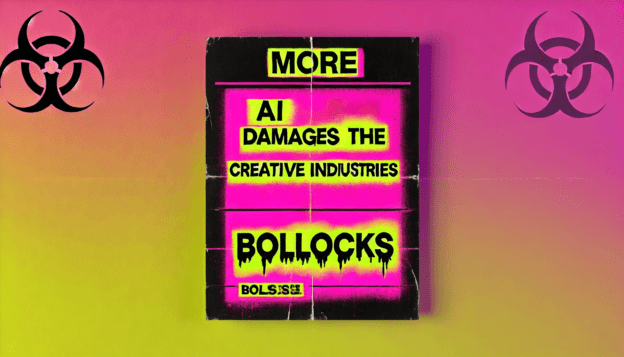The narrative that artificial intelligence is the Grim Reaper for the creative industries has become so common that you’d think every writer, artist, musician, and filmmaker is moments away from losing their livelihood. Headlines scream about AI-generated content, creative robots, and soulless machines taking over art, leaving human creators out in the cold. But does the hype match the reality? Spoiler: it doesn’t.
Let’s unpack the hysteria and expose the bollocks behind the claim that AI is dooming creativity, as we skip into the 33rd article in my satirical comedic polemic series.
“AI Will Replace Artists and Writers”
The biggest claim in the “AI destroys creativity” camp is that AI will replace human creators. Yes, AI can churn out text, images, and music at lightning speed. But what does it produce? Bland, formulaic work based on existing patterns. AI doesn’t innovate, it regurgitates.
AI art doesn’t have intent, context, or soul. It’s great for quick mock-ups or low-stakes content, but when was the last time an AI-generated image made you feel anything profound? The idea that AI will “replace” artists or writers is overblown bollocks; it’s a tool, not a rival.
“AI Devalues Originality”
Another common refrain is that AI devalues creativity by flooding the market with cheap, low-quality content. But let’s not pretend the creative industries weren’t already drowning in mediocrity. For every masterpiece, there are a thousand derivative rom-coms, uninspired pop songs, and generic stock photos.
If anything, AI could force human creators to step up their game by emphasising originality and emotional depth, things AI can’t replicate. The claim that AI dooms originality is lazy bollocks that ignores the resilience of genuine talent.
“AI Puts Millions of Creatives Out of Work”
Yes, AI will change how creative industries operate, automating repetitive tasks and lowering barriers to entry. But let’s not confuse disruption with destruction. History shows that new technology doesn’t obliterate industries, it reshapes them. Photographers didn’t vanish when digital cameras arrived; they adapted. Writers didn’t die out when typewriters replaced quills.
The narrative that millions of creatives will be out of work is alarmist bollocks, designed to stoke fear rather than foster adaptation.
“AI Steals From Human Artists”
The accusation that AI “steals” from artists stems from the fact that generative models are trained on existing work. It’s a valid ethical concern, but is it unique to AI? Not really. Every human creator is influenced by what they consume. AI just does it on a larger scale.
Instead of framing this as theft, maybe we should focus on improving attribution systems and copyright laws. The notion that AI is uniquely unethical is hypocritical bollocks when the creative industries themselves are no strangers to “borrowing.”
“AI Creates Soulless Art”
AI-generated content is often dismissed as soulless, and to an extent, that’s true. AI doesn’t experience emotions, context, or human connection. But let’s not forget that the creative industries already produce plenty of soulless work, factory-assembled pop songs, paint-by-numbers blockbusters, and trend-chasing novels.
AI isn’t the cause of soulless art; it’s just reflecting what already exists. Blaming AI for bad content is a convenient piece of bollocks that ignores systemic issues within the industries themselves.
“AI Will Destroy the Film and Music Industries”
There’s a lot of hand-wringing about how AI will churn out movies and music, leaving traditional creators jobless. But let’s take a step back. AI can create functional scores, generic pop songs, and basic scripts, but can it direct an actor? Craft a gripping narrative? Capture the nuance of live performance? No.
The idea that AI will destroy these industries is tech-driven bollocks. It might change the tools, but it won’t replace the human touch.
“AI Is Just a Corporate Tool to Exploit Creatives”
This argument has some truth, big corporations are using AI to cut costs and maximise profits. But here’s the thing: corporations have been exploiting creatives long before AI showed up. From unfair contracts to royalties disputes, the creative industries have always been tilted in favour of those holding the purse strings.
Blaming AI for corporate greed is misdirected bollocks. The problem isn’t the technology; it’s how it’s being wielded.
“The End of Creativity As We Know It”
This apocalyptic claim is the most dramatic piece of bollocks in the conversation. Creativity isn’t going anywhere; it’s a fundamental human trait. AI might automate some processes and shift the focus of the industries, but it won’t erase the need for human ingenuity, emotion, and perspective.
Creativity thrives on constraints, challenges, and new tools. If anything, AI could spark a renaissance of innovation, pushing artists and writers to explore uncharted territory. The idea that creativity is “dying” is defeatist bollocks.
“Audiences Can’t Tell the Difference”
One of the more cynical arguments is that audiences don’t care whether content is AI-generated or human-made, as long as it’s entertaining. While this might be true for low-stakes content like memes or clickbait, people still value authenticity in art, music, and storytelling.
The success of indie films, hand-drawn animations, and grassroots art movements proves that audiences can tell the difference, and they care. The claim that audiences are blind to the human touch is dismissive bollocks.
Conclusion: AI Isn’t Killing Creativity, It’s Just Shaking Things Up
AI isn’t a harbinger of doom for the creative industries; it’s a disruptive tool, like the printing press, the camera, or Photoshop before it. Yes, it poses challenges, from ethical concerns to shifts in labour dynamics. But it also opens up new possibilities for collaboration, experimentation, and accessibility.
The hysteria around AI and creativity often overlooks one key fact: humans have always found ways to adapt, evolve, and thrive. So let’s stop the fear-mongering and focus on navigating this new landscape. While AI may change how we create, will it also mean the death of creativity? That’s absolute bollocks.
